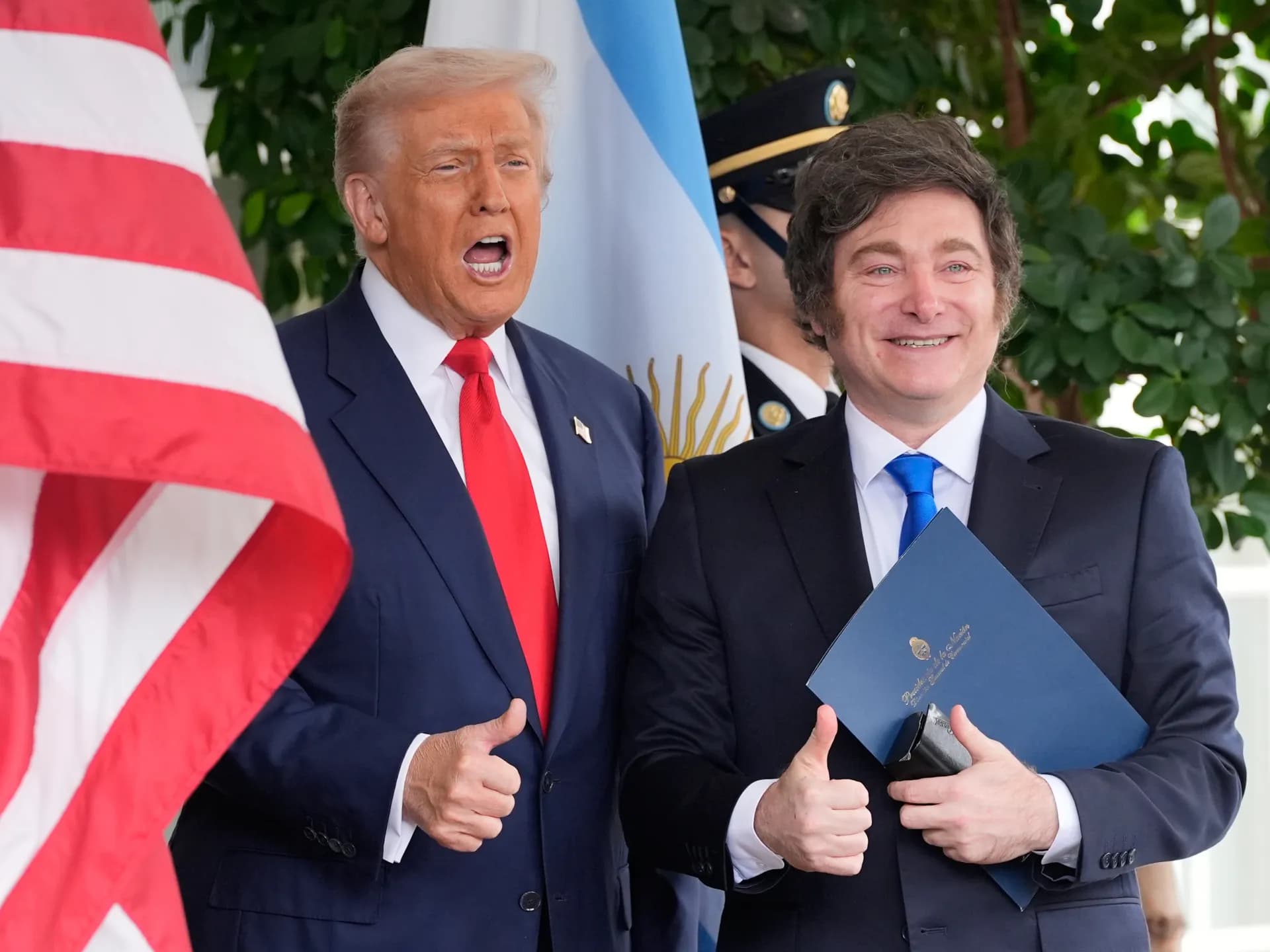We're loading the full news article for you. This includes the article content, images, author information, and related articles.
The United States has announced a substantial financial package for Argentina, explicitly tying the aid to the outcome of the upcoming legislative elections, raising questions about foreign influence in democratic processes.

The United States has unveiled a US$20 billion (approximately KSh 2.9 trillion) financial lifeline aimed at stabilising Argentina's volatile currency, a move openly acknowledged by former President Donald Trump as an effort to influence the South American nation's legislative elections scheduled for Sunday, October 26, 2025. Speaking from the White House, Trump cautioned that the US would not 'waste our time' assisting Argentina if President Javier Milei's party fails to secure a victory in the polls.
President Milei, a libertarian leader, lauded Trump's efforts, stating that the US president's policies would foster 'prosperity.' The announcement comes as Argentina grapples with significant financial turmoil, with the upcoming midterm elections widely seen as a crucial test of public support for Milei's stringent cost-cutting and free-market reform agenda.
Argentina has a long history of economic instability, marked by numerous recessions and debt defaults. Since gaining independence in 1816, the country has defaulted on its sovereign debt nine times. The most recent default occurred in May 2020. President Javier Milei, who assumed office on December 10, 2023, inherited an economy plagued by an annual inflation rate approaching 200%. His administration has since implemented an ambitious austerity and deregulation program, aiming to reduce state debt and address persistent economic problems.
Milei's economic policies have included significant cuts to public spending, reductions in public sector jobs, and freezes on wages and pensions. While these measures have led to a notable decrease in monthly inflation, they have also resulted in a rise in unemployment and poverty rates.
The upcoming legislative elections on Sunday, October 26, 2025, will see Argentines renew half of the seats in the Chamber of Deputies and a third of the seats in the Senate. These midterm elections are the first during President Milei's tenure and will be crucial in determining his ability to implement further structural reforms, as his La Libertad Avanza (LLA) party currently lacks a majority in the bicameral Congress.
For the first time since 2011, Argentina will not hold primary elections in 2025, with the Senate having suspended them to reduce costs. The electoral schedule began on April 19, 2025, with the closing of the provisional electoral roll. Party alliances and coalitions had until August 7, 2025, to register, and candidates until August 17, 2025. The campaign officially commenced on August 27, 2025.
The US government's explicit linkage of aid to election outcomes has drawn attention. Former President Trump's remarks highlight a direct interest in the political landscape of Argentina. President Milei, in turn, has publicly aligned himself with Trump's economic philosophy. The implications of such overt statements on the sovereignty of Argentina's electoral process are a subject of ongoing discussion among international observers and political analysts.
The conditional nature of the US aid package could be perceived as foreign interference in Argentina's domestic politics. This approach carries the risk of undermining democratic principles and potentially fostering resentment among segments of the Argentine population. For Kenya, a nation that also navigates complex international relations and seeks to maintain its sovereignty, such developments offer a case study in the delicate balance between foreign assistance and national autonomy.
Economically, while the US$20 billion aid aims to stabilise the peso, some analysts argue that it may only be a short-term solution and does not address underlying structural issues causing currency instability. Argentina's foreign exchange reserves have been a concern, with a significant portion held in Chinese yuan, limiting their immediate usability for peso stabilisation.
The full terms and conditions of the US$20 billion aid package have not been entirely disclosed, leading to questions about the specific mechanisms of the financial support and the exact nature of the repayment assurances for the US Treasury. There is also ongoing debate among economists regarding the long-term effectiveness of such aid in addressing Argentina's chronic economic challenges, particularly without fundamental reforms like dollarisation, which President Milei has previously considered but delayed.
Observers will closely monitor the outcome of the October 26 elections to gauge the Argentine public's continued support for President Milei's economic reforms. The performance of his La Libertad Avanza party will significantly influence the future direction of Argentina's economic policies and its relationship with international partners, including the United States. The effectiveness of the US aid package in stabilising the Argentine peso and its broader impact on the country's economy will also be a key area of focus.
Keep the conversation in one place—threads here stay linked to the story and in the forums.
Sign in to start a discussion
Start a conversation about this story and keep it linked here.
Other hot threads
E-sports and Gaming Community in Kenya
Active 9 months ago
The Role of Technology in Modern Agriculture (AgriTech)
Active 9 months ago
Popular Recreational Activities Across Counties
Active 9 months ago
Investing in Youth Sports Development Programs
Active 9 months ago